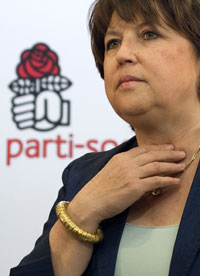A good result for the centre-right, a bad one for the main opposition parties
 Aubry gets it in the neck
Aubry gets it in the neckEUROPEAN elections carry a haunting memory for Nicolas Sarkozy. Ten years ago, as head of the Gaullist list, he was battered into third place. That defeat marked the start of a little-known three-year political exile for the aspirant leader. So this week’s result was especially pleasing for the president. His UMP party came top, the first time since 1979 a sitting president has done this with 28% of the vote. The Socialist Party scraped a miserable 16.5%.
Mr Sarkozy’s success was impressive given the recession, the tendency of French voters to punish incumbents and his own unpopularity. In May the president’s approval rating dropped to 32%, according to TNS Sofres. Yet Mr Sarkozy not only saw off the far-right National Front, thanks to tough anti-crime talk and a promise to oppose Turkish entry into the European Union, but also drove home his slogan, “When Europe wants to, Europe can”, talking up the hyperactive French presidency of the EU in the second half of 2008. His score mirrors the 31% he took in the first round of the 2007 presidential election, suggesting that his base is solid.
Mr Sarkozy has also divided and weakened the opposition. He has pinched the left’s rhetoric, denouncing “financial capitalism” and calling for a “Europe that protects”. He has grabbed its talent, putting many left-wingers into government. Voters were left to shop around for a credible alternative to the lamentable Socialist Party, which only just avoided losing to the Greens, who took 16.3%. Even the Socialist spokesman, Benoît Hamon, lost his seat. In all but one of the 20 arrondissements of Paris, a city with a Socialist mayor, the party was trampled into third place.
The Socialists were not the only opposition party to suffer. François Bayrou, a centrist, bagged just 8.4%, ten points less than in the first round of the 2007 presidential poll. His ferocious anti-Sarkozysme backfired, casting him as a bitter, obsessive figure. Olivier Besancenot’s New Anti-Capitalist Party secured under 5%. The only opposition winner was Europe Ecologie, a group of green activists, film-makers, anti-globalisation campaigners (José Bové) and one-time revolutionaries. It is led by Daniel Cohn-Bendit, a Franco-German figure from May 1968 who is now more a bourgeois eco-romantic than a hardened rebel, and Eva Joly, a Franco-Swedish retired magistrate. This unlikely pair of 60-somethings drew those disaffected from the mainstream but repelled by extremism.
The outlook for the Socialists is dismal. Martine Aubry, who was elected party leader six months ago, admitted that her party had “not been credible”. Younger aspirant leaders mutter about the need for an “electric shock”. There is talk of reaching out to the Greens. But even her critics concede that there is no unifying rival capable of imposing authority, a fresh image or new thinking. Ségolène Royal, the party’s defeated presidential candidate, is distrusted by many. After a leadership meeting this week, Ms Aubry is likely to stay in the job. The Socialists may be condemned to another period of futile introspection.
Mr Sarkozy’s authority has increased. He will reshuffle some ministers, partly because two—Rachida Dati at justice and Michel Barnier at agriculture—are off to the European Parliament. But the prime minister, François Fillon, will stay, along with Christine Lagarde at finance and Bernard Kouchner, the foreign minister. Mr Sarkozy may further embrace greenery. He may not be popular, but this result validates his central strategy: mobilise your friends and divide your enemies.
